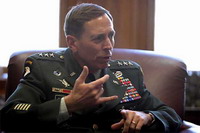Britain welcomes US commander in Iraq
The top U.S. commander in Iraq informed American allies about the course of the war Tuesday, emphasizing shared goals and sidestepping questions about a fatal shooting of civilians by private security contractors.

The visit to Britain by Gen. David Petraeus and U.S. Ambassador Ryan Crocker comes a week after their testimony to American lawmakers, which cited recent gains in security and a decrease in sectarian killings, but warned of little political progress in Baghdad.
Despite their upbeat mission, the men were peppered with questions about the shooting incident involving Blackwater USA, a North Carolina-based company that protects American diplomats and other notables in Iraq.
The Iraqi Interior ministry has banned the contractors from working in the country following the shooting, which is believed to have taken place after a car bombing Sunday.
The incident in western Baghdad left eight civilians dead, and outraged many Iraqis, many of whom see the private contractors as bullies and mercenary forces unconcerned about the local population. Crocker declined to say how the United States stood on the issue.
"An investigation of that incident is under way and it would be inappropriate to comment until the investigation is finished," Crocker told reporters during a news conference at the Royal United Services Institute in London.
Speaking before a meeting with Prime Minister Gordon Brown, Petraeus constantly praised British forces serving in Iraq, repeating his assessment of stability in Iraq in the wake of the "surge" of American forces.
He also offered support for Britain's plan to give Iraqi security forces control of Basra province later this year or earlier next year.
"In the four southern provinces of Iraq, under the British led multinational division, the transition to overwatch is already well along," he said.
"While there have been challenges and set backs ... Iraqis have generally been able to deal with the challenges with minimal assistance, although help has been provided on occasion."
Brown will outline his plans for British troops in a speech to Parliament next month. British defense minister Des Browne has said there may be some reduction in numbers when soldiers ending current tours are replaced in November and December.
U.S. President George W. Bush has embraced Petraeus' plan to withdraw 5,700 troops from Iraq by the end of the year and reduce the force from 20 combat brigades to 15 brigades by next July. Petraeus is expected to make a further assessment and recommendations in March.
There are about 169,000 U.S. troops in Iraq.
Britain is reducing its force in Iraq to 5,000, mostly based around Basra, Iraq's second-largest city, 550 kilometers (340 miles) southeast of Baghdad.
Calm has largely prevailed in the predominantly Shiite city of about 2 million since the British soldiers pulled back to the airport, handing over responsibility to Iraqi security forces.
Former British Prime Minister Tony Blair paved the way for the move in February, when he ordered a troop reduction from 7,100 to 5,500.
Petraeus warned against pulling out too early.
"There are no easy answers or quick solutions to helping the Iraqis build sustainable security and achieve national reconciliation," he said.
"Our assessments underscore the importance of recognizing that a premature drawdown of our forces would likely have devastating consequences not only for Iraq and the region, but for our nations and the world."
Subscribe to Pravda.Ru Telegram channel, Facebook, RSS!


